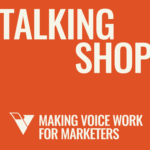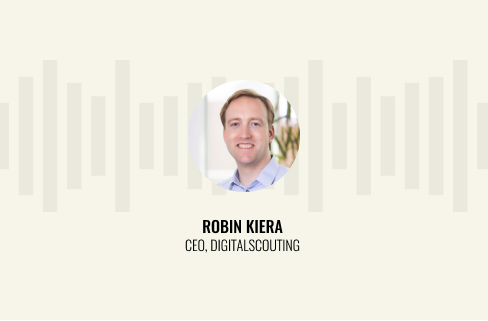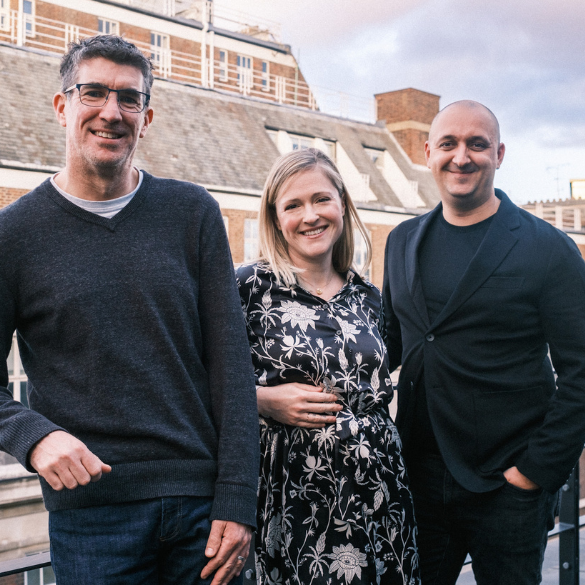
Listen to Talking Shop Episode 6
Listen to Episode 6 of Talking Shop: Making Voice Work for Marketers right here. Talking Shop is a brand new podcast series from Vixen Labs, taking you through the core findings and insights from the Voice Consumer Index 2021.
A while ago, contactless payments were a novelty. Now, they’ve become the norm. Could it be the same with voice payments? According to Dr. Robin Kiera, banks could benefit hugely from using voice technology. From PSD2 integrations to voice skills that enable balance checking with one utterance, the future of voice in banking sounds very promising.
Or read the transcript
James Poulter 00:03
Well, it is 2021, and the past couple of years have not only affected the way in which we shop, the way in which we play, and the way in which we learn, but definitely the way in which we spend our money. A massive transformation in e-commerce has driven nearly all transactions into the digital-first environment. Contactless payments have gone from being a novelty to now being the absolute default, and cash is being called into question.
James Poulter 00:31
At the same time, the FinTech market is accelerating at an enormous pace — disruption in everything from mortgages to insurance, traditional banks being broken down by challenges, and they are starting their own challenges. And on top of all of that, voice technology has gone rampant through the voice industry and now into banking and finance. And that is what this episode of Talking Shop is all about: business and finance, business and banking, finance and banking.
James Poulter 00:58
The combinations are endless, but that’s what we’re going to try and talk about here. As you know, recently, we’ve just conducted at Vixen Labs our Voice Consumer Index, pulse report for 2021, looking deep into consumer behaviour and the impact it has for brands and businesses. And one of the biggest brands and business areas that we wanted to look into was this whole area of finance and banking because, well, money isn’t everything, but it makes the world go round. And in this episode, I wanted to get some expert opinion from people that work very closely with these big financial institutions across the world. And there is no better expert to talk to than a doctor in the field of this area. Robin Kiera joins us for this episode of Talking Shop. Robin, welcome to the podcast.
Robin Kiera 01:41
James, thank you so much for having me here. I’m super honoured to be here and voice is a super strategic area and I think we have a lot of fun talking about it.
James Poulter 01:49
Absolutely. Thanks so much for joining us. I believe you’re in Hamburg, Germany, if people haven’t picked that up from the accent, and Robin you run Digitalscouting, and you’re also an ambassador for our friends at the Open Voice Network, who partnered with us on the most recent research. But I think that would…just saying those two things doesn’t give anywhere near the level of credit that should give to your experience and background in the world of finance and banking. Maybe just tell us a little bit about how you came to work in this fascinating industry and how you’ve ended up thinking about voice.
Robin Kiera 02:17
Yeah, totally. I had the luck of starting to work with one of the wealthiest families in Germany. That started my first job, you know, it can’t get worse after that, but I changed them to the insurance industry where I really sold insurance policies on the streets of Hamburg. I always say, between me and the CEO were 27 hierarchies, between me and the hierarchy below only the street to the client. So I still could…but I have been clean for several years, so don’t worry, and after working really at the base of insurance I am, you know, selling insurance in the real world, not in theory. I also did like large scale transformation projects for insurance.
Robin Kiera 02:56
And then I, you know, I went to banking. So, if you know, it’s like, what could you do worse from going from insurance to banking, the bankers don’t like you, they think you’re an insurance guy and insurance people think oh, he was infidel, or you know, so but I got back to insurance all after that.
Robin Kiera 03:12
So I got me back. So that means I know the insurance industry inside out, in from the sales part, also from the internal processes part, from the innovation part, but also the finance and FinTech space, because in the end, I strongly believe both should serve the customer and the customer doesn’t actually care. If it’s insurance, if it’s fine, it’s all about solving problems, and you know, delivering painless frictionless services.
Robin Kiera 03:37
But what do we actually do? Firstly, I ranted on stages and said, ‘you know, you’re going to be out of jobs because of this digital stuff’. And after that, I founded the blog, the blog went through the roof. And out of that came a consulting company, which…we have now 30 people all around the world helping insurers and banks, especially insurers and banks, also the real estate companies, to, you know, figure out this digital thing, strategy being experienced by optimising sales forces and also modernising marketing departments. And voice is an important point because we are called Digitalscouting. So they expect from us to scout trends around the world, and one trend I really truly see is voice. And that’s why I’m so happy that we talked here.
James Poulter 04:16
That’s great. Thanks so much, Robin. It was such a wide and varied experience. I mean, insurance is one of those topics that no one wants to think about until they need it. Banking is one of those things that people have to interact with every day, whether they love it, that day trading on the stock market trying to kind of game forex or crypto, yeah, just worried about whether or not they’ve got enough in the bank account to kind of pay for a McDonald’s on the weekend, you know that it really, really varies, but voice seems to be something that’s cutting across all of these industries and potentially has an impact for those in the B2B space, as well as in the consumer area. Why don’t you just tell us a little bit about where you’ve seen over the past couple of years as you’ve got involved in this area, where there’s most appetite for voice right now in the financial industry.
Robin Kiera 04:59
Well I think voice is just a product on the shelf, or it’s like a symptom of a certain thing. So what I’ve seen, let’s talk about innovation in general. So we have seen insurers and banks doing a great job. And you’ve seen insurers and banks that did a bad job, banks that did a bad job, or, you know, slowly getting into some serious trouble. We have serious problems with a business model, low interest rate, I don’t need to talk about that, because I don’t want to make anybody cry at the end of the podcast.
Robin Kiera 05:25
So, the good times where, you know, the sort of the giants that I think are over, we have severe problems all around the world, in banking, but that’s not the situation in insurance. Nevertheless, it’s a big question, how do you handle innovation? I think voice is like, you know, innovations like sport, you know, two super important things, if you don’t practice it, yeah, you’re not good at it.
Robin Kiera 05:47
You know, if I don’t practice sport, if I don’t go to the gym, it’s really bad. And if you’re not in the field, you can score a goal. It’s two super simple truths. But they’re so important if you talk about innovation in companies.
Robin Kiera 05:59
So, if you do not invest in innovation, when you do not train your people innovation, if you do not train your people in actually dealing and handling voice skills and interaction also with partners, you maybe have that help you, then you have no chance that you are part of something that goes through the roof, no chance if you are not participating in it. And if you do not practice it, yeah. And I think that’s my main message.
“INSURANCE OR BANK, I DON’T ACTUALLY CARE, YOU NEED TO BUILD UP YOUR INNOVATION MUSCLE, AND VOICE IS AN IMPORTANT PART.”
And I sometimes have the funny feeling that we have now everywhere innovation departments. But sooner or later, we need to check this technology for sure.
James Poulter 06:37
So you see an opportunity here for voice across across the industry. Finance has been early, actually, in many cases to try and get some of these use cases off the ground. We’ve seen in the US banks, like JP Morgan, banks like Citigroup, and others starting in things like adding voice to their repertoire of digital channels, big banks, like Bank of America in the US adding things like Erica, their own owned assistant to their banking solutions. And in Europe as well. Many others are kind of trying it both in the challenger space, and in the more established banking sector. But as they’re going in that direction, with the people that you speak to day to day, in these institutions, where are they seeing the opportunity that voice might play to serve either consumers or enterprise customers.
Robin Kiera 07:18
They don’t, they don’t see it. They’re so busy with other daily jobs. I mean, they need to convince clients that they need to pay, that the clients need to pay them and they have too much money on their account. You know, it’s like the difference, the opposite of the concept of interest in the banking space, you have severe problems in the housing market, real estate market, you have some problems in certain financial areas, in insurance, you have major loss events happening around the world, you have COVID business, so there are a million, million problems out there. And voice is not one of them.
Robin Kiera 07:49
But that doesn’t make it less urgent to enter the deal with it. There are some specialists in both industries that try to fight and have the mandate to deal with that. But it’s, it is not a top priority, neither in insurance nor in finance. But it should be one to think about. And I think that’s super important. Because it is an opportunity. I always ask the people when they ask me, ‘Oh, Robin, this is going to pop or not’, independently of the innovation topic. And I say…
“WHAT WOULD YOU GIVE TO BUY FACEBOOK STOCKS IN 2007? WHAT WOULD YOU GIVE TO BE THE FIRST OF YOUR INDUSTRY ON LINKEDIN IN 2010? NOW, THAT MIGHT BE THE CASE FOR VOICE.”
You know? And you need to prepare, you need to build up internal muscle, you need to deal with it. And you need to allocate a few resources on that, at least to scout and do pilots and try it out.
Robin Kiera 08:39
And you have the big problem with the egg and the hen and the tree. If you say that the same in English, you know, what was first? Nobody knows. You know, what the egg or the hen? One of both needs to have been there first. The same with what people say about voice and customers. Is anybody selling insurance policies or banking products via voice? Well, there are insurance and banks that do that, but it’s not in the billions of revenue. On the other hand, if you do not invest into infrastructure, it might never happen. The big problem is the clients, the users. Why? Because if you do surveys and ask them, the answer is not always the truth. It depends on the social situation. And everybody’s for privacy, especially here in Europe. Everybody loves privacy and data protection, all of that. But they all use Google, you know, or other companies and I love them, I love them.
Robin Kiera 09:26
But what I want to say with this, make a difference between what the people tell you anecdotally when you’re a finance decision maker, and look at the proof, at what they’re really doing. Do not listen to them, watch what they’re doing. And if I watch people they have…and if you look at the numbers of devices sold, it’s unbelievable. Also part of your research. And I think it’s super interesting to see what people are doing. People are using this not yet transactional, at least in certain countries, not transactional, but they’re using it and the big…and we have not seen the Uber killer app on there yet. But I have a funny feeling we will at some point because one thing is sure — you can use your hands, it’s easier for me despite all I don’t know, privacy issues, easier to ask my Alexa device: ‘can you please play me this music?’ Instead of going to my phone, it saves me seconds. And you know, I sacrifice my privacy for the seconds. Yeah.
James Poulter 10:18
And I think what, you know, where you started is that this, you know, what, what you’ve just highlighted there is ease and convenience and the speed to activate. And I think one of the things that can come back to my point about insurance and financial transactions is that they are the things that we have to live with. But most of us don’t choose to. They’re not the things that we try and occupy our time with. And we’re always looking for time saving, aren’t we, in those?
James Poulter 10:41
Yeah, but it’s our fault, this industry. I mean, it’s not the fault of the client that they don’t like us, it’s our fault. I mean, we’re not part of their daily lives, it’s not their fault, they’re not too dumb, we are too dumb to make us being part of the day life. Finance has the big advantage, people are checking the chequing account, they are interested in that. Insurance — not so much, but both have the super opportunity to become part of the daily lives of their clients with voice skills, with PSD2, two open banking skills, which by the way, can be combined, also.
Robin Kiera 11:08
So, I worked for a private banker, was one of the first PSD2 banking apps, super successful, limited to effluence. And the most favourite function was ‘what is my worth’. So, you know, especially males, before they go to bed, they check the cheque, they tend to track how much how much the money is. But this means…people to use your app or your voice skill, at the end of their day, in a very private moment, that means you have made it into their private space, which is like a luxury situation. You can also provide other digital products and services. And at some point when they have a pain they come to you because they trust that you solve that problem. So, again, yes, banking is high frequency insurance-not, and they don’t like us. But that’s our problem, we need to change that.
James Poulter 11:52
So, that’s so good. And you mentioned that…this sort of scenario, you know, can you get into people’s private moment there? And what that really speaks to is, you know, can you become part of the habit? Can you become part of the routine that people go through, in the morning or the evening. I don’t know about you, but, like, I’m not, you know, kind of a chronic overchecker of my bank balance, but I’m most likely to do it in the morning when I wake up and I see a bunch of transactions have happened overnight, because I got the notifications or whatever, I’m going to go tap into that.
James Poulter 12:18
And yeah, that can be both dopamine inducing, you know, if you’ve kind of ticked off some things needed to get done, but also can be quite…activate that fight or flight response if things have gone out faster than you’re expecting. And I wonder whether or not you see an opportunity in voice, perhaps providing a maybe…a more human or empathetic way of dealing with some of those tasks that often are quite transactional by their nature and also quite numeric in many ways.
James Poulter 12:46
I think we should really think about who’s in the centre. If I go have a look at innovation portfolios of projects, if I look at presentations from insurance banks or befriended consulting companies as one thing, one constant, and that’s they all think about the organisation, how can we organise us better? How can we, you know, do things better, but not for the clients, but because or for themselves, that’s totally natural. But you know, us as, you know, external crazy experience partner to say, you know, where’s actually the client.
Robin Kiera 13:19
I actually recently had a, I don’t know, 120-page presentation on my desk, or my computer, actually, and was like, on page 80, for the first time to talk about the client, I mean, come on, know who’s going to pay the party. And so who is actually in the centre? It’s not about making more processes, it’s not about the client, end consumer can change their address via a skill. I mean, that sort of pain point solving for the client, it’s a pain point solving for us, it’s okay when we do that at some point.
Robin Kiera 13:19
But we need to, if we want the killer Uber app, or voice skill in our industry, we need to deliver such a service that relieves the client and end consumer of pain and friction. And they, you know, in a lot of cases, they don’t care about our problems, about the address, you say, it’s your problem here, you should actually get, you should actually automatically get somehow my…that my address changed?.Why should I inform you and spend my valuable time doing your job, that I pay you for? And that’s, of course, I do not know what the finance and insurance killer voice skill will look like. Because, if I would know, I would reserve my private island.
James Poulter 14:24
Of course you would, of course you would. So I want to turn a little bit of our conversation now towards some of the findings we had specifically within finance and banking. And, you know, those of you listening, if you’ve read the white paper from the VCI report, or you’ve looked at the executive summary, all of which can be found at vixenlabs.co/vci-2021, you can find that also in the show notes. You will not find, however, some of these kind of cool stats. And if you’ve listened to other episodes in the show, you’ll know that we’ve been going through a series of different insights and deep dives into different industries.
James Poulter 14:53
And we asked in each of these scenarios some top task questions — what types of things do people want to do? What were most important to them to be able to do, regardless of what platform they choose to them on or what technology. And then we ask them what are they most likely to use voice to do these tasks in the future. And particularly in the finance sector, there are some really interesting insights in here. When it comes to the things that were most important to people, the top two boxes that everyone checked in the UK, the US, and Germany were ‘pay a bill’ and ‘check my bank balance’.
James Poulter 15:27
And that’s probably no surprise, these are the things that people do every day. We saw across the board 70% or higher hitting those top two boxes, those repetitive, simple to do, but quite inane tasks that we will have to get into. The third box that we saw people ticking in the UK and the US was very interesting, which was ‘get directions to a physical location’. But our friends in Germany — down at 27%. So Robin, maybe just yeah, we’ve got a country in here on, so maybe speaks to the German perspective, maybe you can just unpack that stat for us, particularly why are Germans so much more or less likely to be looking for a physical location right now when it comes to looking for their bank?
Robin Kiera 16:08
I could try to make a joke and say, we know where we need to go to get our money. Just kidding.
James Poulter 16:15
Yes, okay, fine. Yes. Just kidding. He made the joke about German efficiency. I didn’t. So, I’ll let you have that one.
Robin Kiera 16:24
Okay. Yeah, no, that’s, I think, all kidding aside, it’s really funny because all other statistics and data show that Germany actually is way behind paying digital, way behind using credit cards, or even, you know, debit cards that work as credit, they are way behind all of these payment systems. So, it’s actually really funny that there’s this finding that number three is not looking for physical locations. I do not know the reason. But it’s super interesting that there’s contrast between what they’re actually doing and this finding, and maybe they really know where the nearest bank is, I don’t know, because they’re less mobile, possibly.
Robin Kiera 16:58
But we also have seen the situation that retail banks have been shutting down like in the hundreds and thousands. So I’m even surprised that anybody goes there still. And maybe that’s what we could look at and would be interested in, if we could see maybe dying of the retail bank. If that’s faster here, then you can…yes, maybe that has a correlation with that.
James Poulter 17:18
Well, certainly from some of the other data or information we’ve seen is that that, you know, generally speaking, there is a lot more focus on online banking services. But the thing that’s always stumped me slightly, in terms of the German kind of market, is the lack of wanting to pay online. I remember in the early days, things like PayPal, and, you know, kind of looking at some of those kind of early digital services or, you know, kind of mobile banking terminals and contactless, Germany has always been way behind. But at the same time, there seems to be this kind of breakdown of reliance upon physical bricks and mortar stores.
James Poulter 17:47
And that, I suppose, then juxtaposes with this really interesting thing around the opportunity that presents for banks to serve their customers in a different way. Right? And you’re obviously, you’ve seen this a lot with the consultancy that you do with these types of clients. How are banks then thinking about how they might serve clients for those frequently asked questions, and those simple transactional information, if they’re not relying upon physical stores? Is digital, actually, paving the way then?
Robin Kiera 18:13
I would love to say yes, but I fear I do need to say no, because that would have the prerequisite of that you think about your client and not for your need. And they don’t, in a lot of cases, they think about my brand, my career, my problems, my issues, my low interest rate, and that has not changed it. Who’s been doing a very good job for years? It’s ING all around. So I think they could be there, for example, super good. I’m not sure if they’re strong in voice, but then, but all other digital products and services are super interesting. And they are pushing it a lot. So that’s a very good example of doing that, actually That again, of course, the voice skill could, or voice, things could supplement that. But the big problem is, then, I’m not sure if the whole organisation is ready for that, to be quite honest.
James Poulter 18:59
It’s interesting, though, as we look at, obviously, these top tasks that people really care about, but then when we look at what they’re most likely to use their voice to do. This is where one carries over and one rises to the top, the one that carries over is checking my bank balance, which feels to me like, as you highlighted before, in our conversation, yeah, this is the thing that we all obsess over how much money do I have, whether you’re rich or poor, you’ve got loads of it, or you’re always after more of it.
James Poulter 19:22
Yeah, whichever end of that spectrum, you probably care how much is in the bank. But the thing that follows very quickly behind this is ‘find answers to common questions’. And yeah, we’ve seen this time and again, in each of the industries that we’ve dived into, this role that voice can play in providing answers to FAQs, frequently asked questions, that the top 20% of stuff that rises to the top right serves usually the 80% of customers that are asking for it is that classic 8020 rule. Yeah, where do you see opportunity for that, particularly in some of these more complex financial markets like insurance where often it’s not very clear what my policy covers or is not very clear what I’ve been playing before. Did you see an opportunity here?
Robin Kiera 20:03
Totally. But I would not only see it in answering frequently asked questions, I would see it in becoming the daily companion, in supporting your clients in financial and risk questions, that’s what actually finance insurance is all about. It’s about, yeah, one thing is, you know, managing assets, gaining assets, and the other one is saving and securing these assets against the risks of daily life. This is insurance and finance in a nutshell. And I really cannot understand why we limit ourselves just to boring policies and bad, you know, transaction experiences — why can we actually become part of the daily life of our customers, on all platforms where the attention actually is, and if all data shows us clients are going into voice, then it’s our job as an industry to go after them? You know, and the good salespeople, actually, and good retail bankers, they did it, they go after the clients. So I do not understand the hesitancy actually going after the client on this new platform. But again, not only for transactional questions, not only frequently asked questions, but why not becoming the point to go for all questions concerning finance and risk topics.
James Poulter 21:08
I suppose insurance is an interesting one, when it comes to this digital companionship side of things, because, obviously, insurance covers many, many different topics, from home and floods through to, you know, kind of health insurance. And that’s another area that we’ve seen actually quite a lot of advancements in this, in our episode talking about health, we’ve been looking at this idea of, you know, kind of how digital companionship and voice might be able to help in that health journey. And obviously, health insurers, particularly in the UK, here, I’m thinking of products like Vitality, who’ve been quiet on the front foot of using voice and other connected IoT, so become more of that companion role, bringing the role that insurance has into the forefront of consumers’ minds, rather than that kind of background safety net, do you think that that’s how we might see more insurers moving that model of being that ever-present companion?
Robin Kiera 21:54
That would be a very smart move, because it saves you also a lot of money, and you’re able to make a lot of money. I would not limit it only to insurance, but also banks. If you are there in the moment the client needs you, you know, that’s great, because you know, he or she talks to you directly. And you just need to say, what do you want — product A, B, or C? And that’s the whole idea of it. And, and I think that’s something important we need to talk about…it’s really, where’s the attention of the client?
Robin Kiera 22:20
What kind of services can we provide to them? And actually, then be there. I think that’s the important thing.
“LET’S BE THERE WHERE OUR CLIENTS ARE. THE DATA SHOWS US — THEY ARE, IN A LOT OF CASES, MOVING INTO VOICE.”
Yes, we have not seen the Uber app yet. But maybe it’s time that we do not let other industries actually go and be the first, you know, contact point or the clients. But while it’s not, I always say, why do we need to repeat all errors of the past? We were last on the internet. We were last on social media, the last time I checked, do we need to be last with everything?
James Poulter 22:49
Oh, let’s hope not. Let’s hope not. One of the things that we’ve seen voice and banking kind of be first is often in the era of mobile accessibility. You hear people adding voice interfaces, not to the third party services of Alexa and Google Assistant, but often building them into the first party banking app, which ultimately is replacing the branch. The areas, the primary contact point for most people, when it comes to interactions, either with their pension provider, their mortgage provider, their insurer or obviously back in a day to day retail bank. What’s your kind of take at the moment on how well that’s going for those people out there that began these implementations? You know, how smart are these smart integrations right now?
Robin Kiera 23:34
I’m sometimes astonished how slow we are in providing our clients digital services that matter. A good example is Finanzguru, which is like a FinTech from Germany, great PSD2 open banking, a data aggregator of different chequing accounts, a super interesting case. It took them years to come up with a good categorisation. What does it mean? James, you have certain income, certain outcome, not outcome, but expenses, and, you know, this AI can categorise that, so, yes, you can analyse at the end of the month where the money went. It sounds super simple technically, super complex also because structured lines are changing, and data is a disaster, and…but it took him years for that, so I think banking and insurance both have the gigantic opportunity to again become part of the lives of our clients, when we provide them the services that people actually like.
Robin Kiera 24:24
And independent of any platform, voice is a big topic, and I think, what is better than you going into your car, which is connected, and saying: Car, please tell me how much money do I have in my chequing account’, and then they say this and that, and there are five bills that need to be paid. And maybe you say, you know, at some point, ‘Oh yeah, let’s these three’. ‘Okay, the other ones I need to check, please send them to my bookkeeper’, whatever it is. We need to think about how can we relieve pain from the lives of our clients.
Robin Kiera 24:56
Good example. For example, we have in Germany — it’s the Uber competitor MyTaxi/Free Now. So why do I use that? I use that because that provides me with a digital bill. I do not use regular cabs anymore, because what’s going to happen when regular bills get lost? So, I cannot hook that into my bookkeeping system, and my bookkeeping and tax guy is going to kill me.
Robin Kiera 25:23
“IF YOU HAVE A GOOD DIGITAL SERVICE, CLIENTS WILL DECIDE INDEPENDENTLY OF PRICE. AND THAT’S SOMETHING EVERY CFO AND CEO IN INSURANCE AND FINANCE SHOULD UNDERSTAND.”
Let’s end the price discussion. You know, what you want to have is clients that don’t care how much your service costs because you relieve pain off them. And if you are the bank or the insurer that, you know, does it differently, better, where everybody loves it, or even better, you don’t even, you know, appear except with good content to help them, they will be in love with you, and nothing is better. And I think we all learnt this from Steve Jobs — when clients are in love with you.
James Poulter 25:57
Absolutely. Well, the one thing that Apple, and, you know, you mentioned Steve Jobs. So let’s go there. Apple’s an interesting case in point here, because for a long time, they have led the way when it comes to privacy and security on iOS as a platform, and the same maturity when it comes to voice — Siri has a much more closed ecosystem than that of Alexa or Google Assistant. And even though Android presents potentially a much wider commercial base for banks and FinTechs, to get involved in iOS is often the gold standard and what people aim for because of that security approach.
James Poulter 26:29
But when it comes to voice, privacy is the thing that no, no big surprise, we’re most concerned about when it comes to banking, voice and privacy, they often don’t go hand in hand, that’s been a concern. And even though the data suggests to us that many people have now overcome that barrier, when it comes to FinTech and financing overall, it’s still high up there, register of concerns, do you think that these new technologies that we’ve got, things like open banking, things like PSD2, and also the recent changes we’ve seen, and things like GDPR over the past couple of years, do they open up a bigger opportunity now, as we look forward for where finance may be able to come out of this cloud of privacy, and you see more creative implementations?
Robin Kiera 27:14
Despite the impact and the voice, no pun intended, of data security and privacy evangelists in the media, if you look back at history, there has not been one single technology that has been halted or stopped due to privacy and security reasons. I mean, this is something we need to think about. So on which side of history do you want to be — those who, you know, say, oh, the train should not go faster than 30 kilometres per hour, because our brains can damage. So, if you look at all technological advancements, you have these people that say, oh, it’s not possible, and yada, yada, yada.
Robin Kiera 27:52
And in 99.9%, of all technologies, they were wrong. And, you know, the technological advancement in relieving pain of other clients prevailed. And I think it’s important that we deal with that. But I have to say, yes, Android and Apple, there are differences. Technically, I do not understand every single detail. But to be quite honest, we need to be where our clients are. And I think 90-something per cent are using Android.
James Poulter 28:18
So, you need to be where Android is.
Robin Kiera 28:20
Yeah, so what I strongly believe, again, to say is, we need to take that into account, we need to build the best, the most secure apps, that make sense. Not that’s possible, that makes sense.
“IN THE END, IT’S FOCUSED ON: ‘LET’S RELIEVE PAIN FOR OUR CLIENTS’. AND WE ARE CAPABLE OF DOING THAT. THE SKY’S THE LIMIT.”
James Poulter 28:42
So Robin, I mean, privacy, you know, we’ve talked about it, it’s an issue that isn’t going anywhere. And we’ve always known in every technology revolution, there’s that cognitive dissonance between what people say they’re worried about and what they actually do, and it sounds like voice is going to be no different with that. So one thing I wanted to ask you as we close out here is: you look at…you looked at our data and you’re looking at the industry, you’re scouting for opportunities for your clients and customers, it’s in the name, where do you see the next couple of years heading when it comes to voice and the financial industry? Is this upward trajectory, standstill, or is this something that we’re going to continue to see banks and financial institutions shy away from?
Robin Kiera 29:23
No, I would differentiate between those who have used opportunities in the past in both industries and those who have been laggards for all the time. Those, you know, who have been laggards will be…they’ll be late and last here, too. The big question is how much capital do they have left? Or will they be, you know, if it will ever go down or be bought by others, and then, you know, restructured? And there will be first movers that will be innovators that will use this. The big question is who will develop the breakthrough voice app in the finance and insurance space? With that, what will be the digital service that excites everybody, and everybody, you know, makes…clicks ‘yes’, ‘yes’, ‘yes’, ‘yes’, ‘yes’.
Robin Kiera 30:03
And all weird pop ups we are annoyed by when surfing through the internet. And that’s the question. I don’t know. I have a funny feeling that we will be surprised in five to ten years what funny discussions we had.
Robin Kiera 30:15
And I think in five to ten years, everybody will ask their cup, how much money do I have in my bank account, or even more advanced products and services we cannot even think of right now.
James Poulter 30:26
Well, I think we’re all going to be watching closely to Digitalscouting, to the blog, to the chatter, to follow me on Twitter to stay on top of who might be leading the way in this space. Robin, thanks so much for taking the time to hang out with us and talk about where all of this is heading or maybe not. If those people that are listening, want to find out more about what you do and your relationship with OVN, and then also Digitalscouting, where can people find you on the internet to do that?
Robin Kiera 30:53
So if they want to see my serious side, go to LinkedIn, that’s where my presence is. And if you want to see my fun side, go to TikTok request. We have the biggest channel for insurance and finance in the German-speaking countries. But, I promise you, I don’t dance.
James Poulter 31:05
Okay, no dancing. The dancing insurance is yet to happen. But we’ll look forward to that. Dr. Robin Kiera, Digitalscouting, Open Voice Network ambassador, and many other things besides, thank you so much for hanging out with us on this episode of Talking Shop.
James Poulter 31:19
We welcome your opinions, please go follow Robin, go give them a like on TikTok and a share. I’m sure he’ll appreciate that. And thanks to all of you for listening to another episode of the podcast. If you’re interested in all these data points and insights that we’ve covered in today’s episode, you can find out more about that over at vixenlabs.co And if you want to download the latest edition of the Voice Consumer Index for 2021, you can get all of that information if you just hit backslash vci-2021. And you’ll be able to download the Executive Report, White Paper, and check out other episodes on the podcast as well. We’ve dived deep into other subjects around the data, including retail, we’ve looked at healthcare, and we’ve got many others coming down the line as well. So please do go check that out.
James Poulter 32:02
For now, I’ve been your host James Poulter. Find me online @jamespoulter, and around the internet pretty much everywhere else. And thanks so much for being here on another episode of Talking Shop. We look forward to speaking to you soon and hopefully make voice work for your brand or business.





